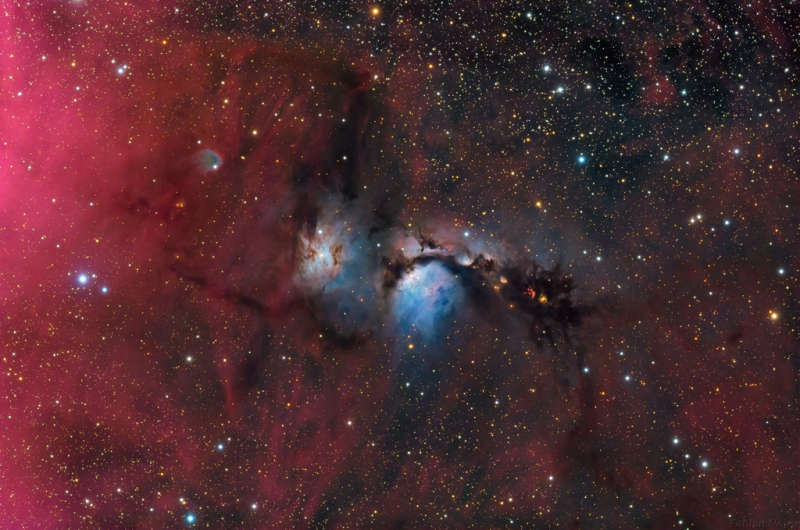Credit & Copyright: Fabian Neyer
Explanation:
Interstellar
dust clouds and
glowing nebulae
abound in the fertile
constellation of Orion.
One of the
brightest, M78,
is centered in this colorful,
wide field view,
covering an area north of
Orion's belt.
At a distance of about 1,500 light-years, the
bluish reflection nebula is around 5 light-years across.
Its tint is due to dust
preferentially
reflecting the blue light
of hot, young stars.
Reflection nebula NGC 2071 is
just
to the left of M78.
To the right, and much more compact in appearance,
the intriguing McNeil's Nebula is a recently
recognized variable nebula associated with a young sun-like star.
Deeper red flecks of emission from
Herbig-Haro objects, energetic jets from stars in the process of
formation, stand out against the dark dust lanes.
The exposure also brings out the region's fainter pervasive
glow of atomic hydrogen gas.
1999 2000 2001 2002 2003 2004 2005 2006 2007 2008 2009 2010 2011 2012 2013 2014 2015 2016 2017 2018 2019 2020 2021 2022 2023 2024 2025 |
Yanvar' Fevral' Mart Aprel' Mai Iyun' Iyul' Avgust Sentyabr' Oktyabr' Noyabr' Dekabr' |
NASA Web Site Statements, Warnings, and Disclaimers
NASA Official: Jay Norris. Specific rights apply.
A service of: LHEA at NASA / GSFC
& Michigan Tech. U.
|
Publikacii s klyuchevymi slovami:
reflection nebula - emission nebula - Tumannosti mezhzvezdnye - otrazhatel'nye tumannosti - Orion
Publikacii so slovami: reflection nebula - emission nebula - Tumannosti mezhzvezdnye - otrazhatel'nye tumannosti - Orion | |
Sm. takzhe:
Vse publikacii na tu zhe temu >> | |
